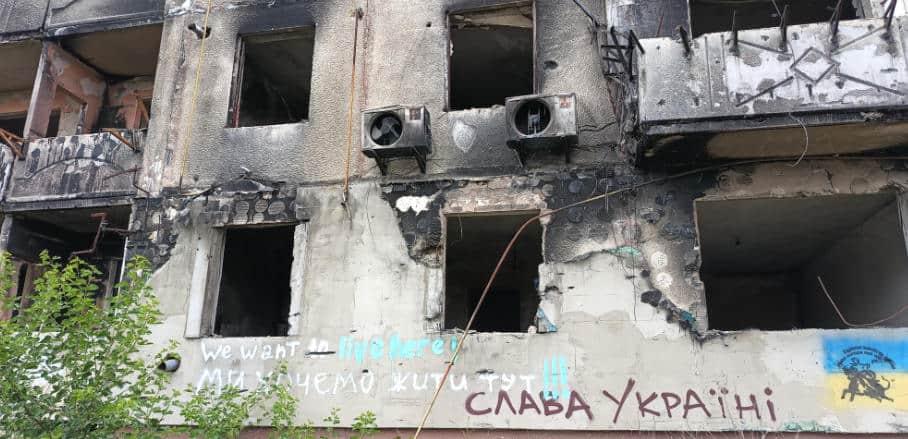Supporting Inclusive and Sustainable Urban Recovery Planning in Ukraine to ‘Build Back Better’
As Ukraine’s cities are already starting to build back, UNITAC supports them with evidence-based recovery planning and a people-centred approach to foster resilient and inclusive reconstruction.
On 24 February 2022, Russia launched a full-scale invasion of Ukraine, which has since caused devastation and casualties, particularly in the cities, forcing around 6 million people to flee Ukraine and approximately the same number to gain the status of internally displaced. The damage to civil infrastructure, housing, cultural and educational facilities, and the environment has been happening in the East of the country since 2014, yet in February 2022 gained an enormous national scale. Local governments are under acute pressure to rebuild their communities and restore basic services and bring back those who had to leave. Although the war continues, Ukraine is already thinking and preparing the way for the country’s recovery.
Navigating Complexity: UNITAC’s People-Centered Strategy for Ukraine’s Cities
Recovery planning is a complex and multidimensional task. Subsequently, it is also highly context-specific and requires tailoring to the unique challenges and characteristics of each affected area. And it is not just about fixing things: it aims to restore the community by including the social, economic, and environmental context.

Irpin, a city on the Irpin River in Bucha Raion, Kyiv Oblast © UN Habitat Staff
It is equally important to acknowledge that a simple ‘one-size-fits-all’ recovery plan would not work to benefit the needs of people and the local community. To develop such plans, cities require evidence-based information to address the urban challenges they face. It requires up-to-date information on, among other things, the number of people in the area, the presence of key services and facilities and the physical and environmental damages.
The impact of the war varies in neighbourhoods and cities in Ukraine, requiring making it essential to tailor the approach accordingly. The UN Innovation Technology Accelerator for Cities (UNITAC), the joint effort of the UN Human Settlements Programme (UN-Habitat), the UN Office for ICT and the HafenCity University City Science Lab, will support local governments in building upon their digital capacity and strategy to promote evidence-based decision-making for recovery planning, aligning with the ‘people-centred smart-cities’ approach and laying the foundation for resilient and digitally empowered reconstruction to ‘build back better’ Ukrainian cities.
Partnership and Research to Advance Resilient Recovery in Ukraine
To support Ukraine in its evidence-based recovery planning efforts, UNITAC Hamburg collaborates closely with local and regional governments, by building their urban data capacity and strategy, in a BMZ-funded project called ‘Digital tools and capacity for inclusive, smart and resilient urban recovery in Ukraine’. UNITAC’s approach involves in-depth research and an understanding of urban challenges with a strong emphasis on collaboration and participatory methods. Through the deployment of digital tools, UNITAC is driving inclusive digital transformation at the national, regional, and local levels.
In Ukraine, UNITAC’s work involves partnering with selected hromadas (a basic unit of administrative division in Ukraine, similar to a municipality), with a strong focus on developing the existing digital and data skills and strategy of local and national government officials, as well as relevant stakeholders. Through capacity-building efforts and knowledge transfer, the project aims to empower individuals with expertise in accessing, analysing, and utilising data for decision-making, that will go beyond the use for recovery planning.

Borodianka, an urban-type settlement in Bucha Raion, Kyiv Oblast, Ukraine © UN Habitat Staff
The project is committed to strengthening Ukraine’s national digital transformation process, evident in the appointments of the Minister of Digital Transformation and of the Chief Digital Transformation Officers in each hromada.
By partnering with City Science Lab, UNITAC will leverage digital tools for public participation and data platforms to support recovery planning efforts. The strategic alignment of UNITAC with UN-Habitat’s recently established country programme for Ukraine plays a pivotal role in its success. UN-Habitat’s extensive expertise and experience in tackling urban challenges are guided by experts and field knowledge in conflict-affected recovery.
Empowering Communities: Participatory Recovery Planning in Action
Furthermore, local governments will be supported by the development of an urban data platform. The platform generates valuable evidence that feeds into city and neighbourhood profiles for selected locations in Ukraine, offering decision-makers a shared understanding of a city’s needs. This data-driven approach empowers them to build capacities and make informed choices. This provides the basis for urban recovery frameworks including response, recovery, prevention, and mitigation. Moreover, it prepares us for future climate and socio-economic post-conflict risks, building back better towards improved living conditions for all.

A meeting of the experts’ mission with the mayor of Vasylkiv, Mrs Natalia Balasynovych and her team. © UN Habitat Staff
Notably, participatory recovery planning is a key element of a people-centred approach to technology and data deployment. Stakeholders and citizens are actively encouraged to engage in the decision-making process, ensuring recovery plans resonate with people and the community, addressing their needs, aspirations, and perspectives.
The project in Ukraine amplifies the potential of needs-oriented, evidence-based recovery planning. With a focus on collaboration and research, we are determined to establish a recovery plan that is tailored to people’s needs, whilst also considering and building upon the capabilities of the governments. Additionally, through capacity building and knowledge transfer, this project aims to drastically improve data strategy and governance simultaneously, laying the foundation for using spatial data to its full potential in the future.
